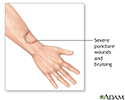Human bites - self-care
Bites - human - self-care
A human bite can break, puncture, or tear the skin. Bites that break the skin can be very serious because of the risk of infection.
Causes
Human bites can occur in 2 ways:
- If someone bites you
- If your hand comes into contact with a person's teeth and breaks the skin, such as during fist fight
Bites are very common among young children. Children often bite to express anger or other negative feelings.
Human bites may be more dangerous than animal bites. Certain germs in some human mouths can cause hard-to-treat infections. You can also get certain diseases from a human bite, such as HIV/AIDS or hepatitis B or hepatitis C .
HIV/AIDS
Human immunodeficiency virus (HIV) is the virus that causes AIDS. When a person becomes infected with HIV, the virus attacks and weakens the immune ...

Hepatitis B
Hepatitis B is irritation and swelling (inflammation) of the liver due to infection with the hepatitis B virus (HBV). Other types of viral hepatitis ...

Hepatitis C
Hepatitis C is a viral disease that leads to swelling (inflammation) of the liver. Other types of viral hepatitis include:Hepatitis AHepatitis BHepat...

Symptoms
Symptoms from bites may be mild to severe, including:
- Skin breaks or major cuts, with or without bleeding
- Puncture wounds
- Bruising
- Crushing injuries
- Tendon or joint injuries
Wound Care
If you or your child gets a bite that breaks the skin, you should see a doctor within 24 hours for treatment.
If you are caring for someone who was bitten:
- Calm and reassure the person.
- Wash your hands thoroughly with soap and water before treating the wound.
- If the wound is bleeding, put on protective gloves if you have them.
- Wash your hands afterward, as well.
To care for the wound:
- Stop the wound from bleeding by applying direct pressure with a clean, dry cloth.
- Wash the wound. Use mild soap and warm, running water. Rinse the bite for 3 to 5 minutes.
- Apply an antibacterial ointment to the wound. This may help reduce the chance of infection.
- Put on a dry, sterile bandage.
Get medical attention within 24 hours.
- For deeper wounds, you may need stitches.
- Your health care provider may give you a tetanus shot.
- You may need to take antibiotics. If the infection has spread, you may need to receive antibiotics through a vein (IV).
- For a bad bite, you may need surgery to repair the damage.
DO NOT ignore any human bite, especially if it is bleeding. And DO NOT put your mouth on the wound.
Possible Complications
Complications from bite wounds include:
- An infection that spreads quickly
- Damage to tendons or joints
People with weak immune systems, such as from cancer treatment, are at higher risk for infection.
How to Prevent Human Bites
Prevent bites by:
- Teaching young children not to bite others.
- Never putting your hand near or in the mouth of someone who is having a seizure.
When to Call the Doctor
See a doctor within 24 hours for any bite that breaks the skin.
Call your doctor or go to an emergency room if:
- The bleeding will not stop after a few minutes. For serious bleeding, call your local emergency number, such as 911.
- There is swelling, redness, or pus draining from the wound.
- You notice red streaks that spread out from the wound.
- The bite is on the head, face, neck, or hands.
- The bite is deep or large.
- You are not sure if the wound needs stitches.
-
You have not had a
tetanus
shot in 5 years.
Tetanus
Tetanus is an infection of the nervous system with a type of bacteria that is potentially deadly, called Clostridium tetani (C tetani).
Read Article Now Book Mark Article
References
Goldstein EJC, Abrahamian FM. Bites. In: Bennett JE, Dolin R, Blaser MJ, eds. Mandell, Douglas, and Bennett's Principles and Practice of Infectious Diseases . 8th ed. Philadelphia, PA: Elsevier Saunders; 2015:chap 320.
West HH, Weber EJ. Mammalian bites. In: Marx JA, Hockberger RS, Walls RM, et al, eds. Rosen's Emergency Medicine: Concepts and Clinical Practice . 8th ed. Philadelphia, PA: Elsevier Ssunders; 2014:chap 61.
-
Human bites - illustration
Human bites present a high risk of infection. Besides the bacteria which can cause infection, there is risk of injury to tendons and joints when the wound extends below the skin. Anytime a human bite has broken the skin, seek medical attention.
Human bites
illustration
-
Lyme disease and related tick-borne infections
(In-Depth)
-
Stinging nettle
(Alt. Medicine)
-
Shingles and chickenpox (Varicella-zoster virus)
(In-Depth)
Review Date: 5/14/2016
Reviewed By: Jesse Borke, MD, FACEP, FAAEM, Attending Physician at FDR Medical Services / Millard Fillmore Suburban Hospital, Buffalo, NY. Also reviewed by David Zieve, MD, MHA, Isla Ogilvie, PhD, and the A.D.A.M. Editorial team.

